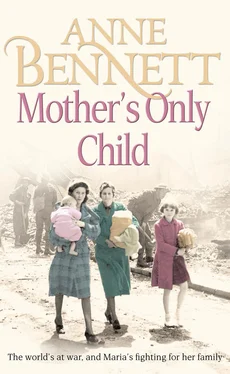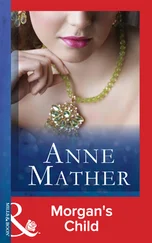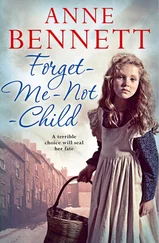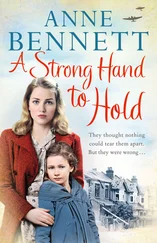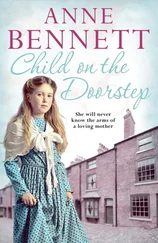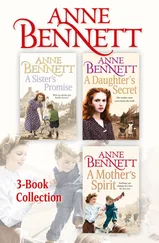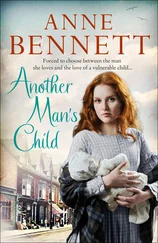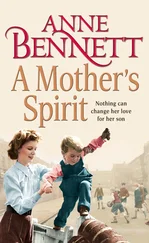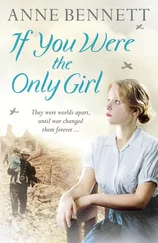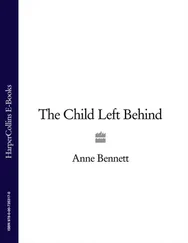‘D’you mind that time?’
Bella remembered it well. Sarah’s grief had been so deep and profound, Sam had worried for her sanity. They travelled down for the funerals. Seeing everyone there so mournful and sorrow-laden had made Sarah worse.
‘Daddy was so sad it near broke my heart to see him,’ Sarah said to Bella. ‘He didn’t seem to see anything around him and it was up to my brother Sean to keep the farm ticking over.’
It was arranged that a widowed aunt called Agatha, whose children were grown and married, would see to things in the house and Sam and Sarah returned to Moville.
‘I never thought I’d be happy again in the whole of my life,’ Maria reminded Bella. ‘And then I found I was expecting. A little life would be dependent on me, something to go on for.’ She grasped Bella’s hand and went on, ‘You showed what a true friend you were then, for you showed not a trace of envy and yet I know how you had always longed for a child of your own.’
That brought the tears to Bella’s own eyes, for it was a burden she carried with her always.
‘When Maria was born, in 1925, I thought her the most beautiful baby in all the world,’ Sarah said, ‘and for sixteen years she has been at the forefront of my mind all the time. I love her so much, Bella, and I really can’t bear the pain of losing her. Once Maria leaves this village I know she will never come back to live.’
‘You will get through this, you know,’ Bella said. ‘It will take time, but it will get easier. I thought when my man died I’d never recover from it.’
‘That was a tragic time, right enough,’ Sarah agreed. It had been a tragic time for both of them. Sarah had just has the disastrous fall that rendered her sterile and was in the hospital. Bella was looking after the toddling Maria, when her husband, a fine, strapping man, who’d never had a day’s illness in his life, suddenly keeled over as he was getting up from his dinner, and was dead before he reached the floor.
‘We supported each other then,’ Bella said.
‘Aye, and wasn’t it wee Maria who was the salvation of us both?’
‘She was indeed,’ Bella agreed. ‘Then Mammy said she couldn’t manage the shop on her own and asked me in with her. I don’t know whether she really couldn’t manage, or did it for me, but I know the occupation of it was a good thing.’
‘I know it,’ Sarah said. ‘But what occupation could I take up that will chase the heartache from me?’
Bella had no answer to this and Sarah went on, ‘I knew that Maria was good at sewing and all. I mean, I taught her to sew, darn, embroider, that sort of thing, and in time she was better than me—far neater, and faster too. I knew she had an eye for colour, the things that go together. Whenever we went in the draper’s shops in Derry, she’d be fascinated by the array of fabrics. She’d feel them between her fingers and be amazed by the different things you could sew on to decorate clothes. She’d prowl around the haberdashery counter like another child might do around a cake shop.
‘I took it as a good, wifely attribute, especially when she mastered that old treadle machine. I told her she’d be a catch for any man, for you know she could make something out of nothing, and I encouraged her to go to evening classes for dressmaking. People say you can’t make a silk purse out of sow’s ear—well, I think Maria probably could.
‘She’s a tidy cook too—we all know the way to a man’s heart is through his stomach—and she’s helped me with the laundry this past year or so. She can poss the clothes, starch and iron with the best of them.’
She looked at Bella with mournful eyes and said, ‘She’ll make a good wife for someone in a year or two, when she is fully grown. That’s what I want for her—to marry a boy here so I can still see her and help her rear any children she might have. It’s all I’ve wanted since the first moment I held her in my arms, and if it hadn’t been for this damned war it would have happened like that. Whatever Philomena Clarke wanted, without the war, Maria going to the Academy would have been impossible.’
Bella knew that was true. By the time Maria finally left school at Easter 1939, everyone knew Britain, and therefore Derry and the other counties across the Foyle, was perched on the brink of war, despite Chamberlain’s claim that there’d be ‘peace for our time’, the previous September.
As soon as Easter was over, Maria had got a job in the shop with Bella and her mother, Dora, and began at her evening classes, but wasn’t in the house when Philomena went to see her mother and told her about the Grafton Academy in Dublin where the gifted Maria could learn Dress and Fabric Design, which would fit her for a fine and well-paid job in a Dublin fashion house later. ‘I am sure she will win a scholarship,’ she’d said. ‘The girl has an amazing talent. I’ve never seen or taught someone so good before.’
‘But she’s so young,’ Sarah had said. ‘Little more than a child.’
‘We’re not talking about now,’ Miss Clarke said gently. ‘But of two years’ time. Maria will be sixteen then.’
‘But where would she stay?’
‘Well,’ Philomena said, ‘I have been making enquiries and the college has a hostel nearby. I believe the rates are very reasonable.’
And there the discussion had ended, for times had been hard for years. Often Sam had repaired a boat for a neighbour, knowing that if he insisted on payment the man and his wife and children would not eat. How could he do that? Sometimes he took his payment in fish, sometimes in instalments, and sometimes he’d get nothing at all. He was glad his parents, who’d died within a month of one another in 1935, were no longer there to provide for from a yard that paid so little. In those lean pre-war years Sam often thanked God that he had just the one child to rear, though he would have loved a son.
When England finally made the declaration of war with Germany in the autumn of 1939, life became harder still. There was no longer any fishing at all, for Lough Foyle was commandeered by the navy, and so were the docks in Derry, which were renamed HMS Ferret. Lough Foyle was quickly filled with naval warships, destroyers, frigates, corvettes and converted trawlers.
The open sea, full of mines and German submarines, was no place for fishermen either, so they hung up their nets and many younger men enlisted in the armed forces, despite the neutrality pact.
Sam too had little work, although there was a small fishing fleet still operating in Lough Swilly on the other side of the peninsular. There he was able to pick up a bit of repair and maintenance work. Sometimes, though, he had so little to bring home at the end of the week, he was ashamed.
Many of the women took themselves off to Derry to work in the shirt factories, most now converted to making uniforms for the armed forces. In a good few homes it was the women who put the food on the table. Sam knew himself how it cut into a man’s pride to see his wife provide for the family while he was idle. He was embarrassed that he was often dependent on the money that Maria would tip up on the table every Friday evening and the big bag of groceries that Bella would pack for her. They got by, like many others, but there was no money to spare and certainly none to send a daughter off to Dublin to train in some fancy academy. Sarah told Philomena Clarke that firmly. Maria never knew of her visit.
In June 1940, the rescue of the British from the beaches of Dunkirk was heroic, but while the operation was a magnificent achievement, it was still a defeat, a fact that couldn’t be disguised. Most of mainland Europe was under Nazi control and only a small strip of water separated Britain from the German Armies, massing ready for invasion on the French coast.
Читать дальше
